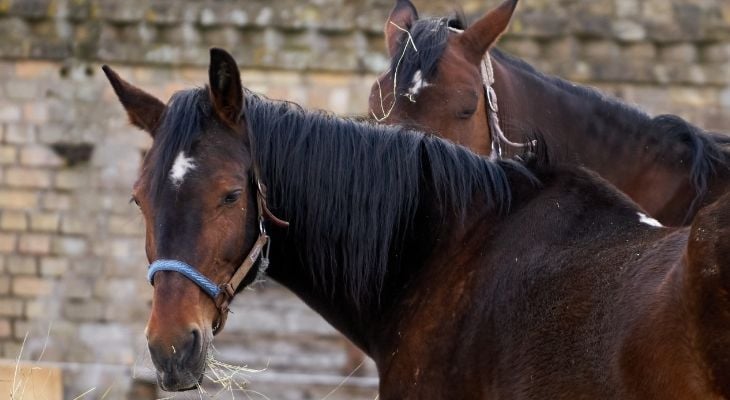
A horse’s digestive system begins with the mouth, ends with the anus and incorporates all the organs in between that are involved in consuming and processing food. Its purpose is fourfold: to digest food, absorb nutrients, move food through the digestive tract and eliminate waste products in the form of feces. Digestive problems can occur anywhere along the way. Changes in bowel movements — including a change in the frequency of bowel movements, a change in the color or consistency of feces or the presence of blood — are common signs that something is wrong.
Examining Your Horse’s Digestive System
Your equine veterinarian will need to thoroughly examine the horse to make a diagnosis. This starts with a health history and a physical examination. To diagnose digestive troubles, your vet may do any of the following:
- Visually inspect your horse’s mouth for moistness and changes in color
- Check your horse’s heart rate
- Manually feel the chest and abdomen
- Tap your horse’s abdomen or listen for abdominal sounds through a stethoscope
- Rectally examine your horse
- Take a sample of your horse’s feces
- Order additional tests, such as a bacterial culture
- Use other equipment, such as a stomach tube or long needle, for tests
- Take X-rays
- Take a biopsy of intestinal or liver tissue
- Conduct blood tests
Infectious and Noninfectious Diseases
Digestive issues can be divided into infectious and noninfectious diseases. Infectious diseases usually enter your horse’s digestive tract through its mouth, such as by accidentally ingesting contaminated water or food. Contaminants could be bacteria, viruses or parasites.
Noninfectious causes of digestive problems include overeating, consuming chemicals, obstructions, poor nutrition or a digestive system injury. Serious diseases or problems affecting non-digestive organs could cause gastrointestinal (GI) problems as side effects.
Whether your horse is suffering from an infectious or noninfectious digestive health problem, it might exhibit the following symptoms.
Diarrhea
Diarrhea is one of the most common symptoms of digestive health issues, and can be very serious. Causes include bacteria, malabsorption of nutrients and viral infection. If your horse has a severe case of diarrhea, it could become so dehydrated and have such a poor electrolyte imbalance that it goes into shock.
Colic
Colic can be divided into three types; all are painful and potentially life-threatening. Gas colic is the most common. It stems from gas collecting in the horse’s bowels. If your horse has gas colic, it may swing its head and stomp. Watch for rolling eyes and pinned ears, and listen for loud stomach rumblings.
An accumulation of parasites, food masses or other foreign bodies in the bowels or sand in the intestines causes obstructive colic. Symptoms include restlessness, lethargy, sweating, pawing and an abnormally quiet stomach.
The third form, twisted gut, means your horse’s intestine is physically twisted. This extremely painful condition causes sweating and restlessness and doesn’t respond to ordinary pain medicines.
Colitis
Colitis has both infectious and noninfectious causes, including bacteria, parasites, Potomac Horse Fever and equine coronavirus. In many cases, no cause is identified, but the symptoms are clear. Horses with colitis have such severe diarrhea that the loss of fluid causes low blood pressure. As blood flow decreases to vital organs, horses can go into shock and die.
Once a horse has colitis, its colon loses the ability to efficiently absorb nutrients and water. The bacterial population necessary for normal digestion also shifts. Depending on the case, colitis may affect only part of the GI tract or the whole thing.
Overo Lethal White Syndrome (OLWS)
Overos — that is, horses with white patterns of coloration over a dark coat — are most likely to develop OLWS. When two carriers of a defective gene mate, they can produce an all-white foal with blue eyes whose GI system fails to develop regularly. These foals aren’t able to pass feces and, thus, get colic. Unfortunately, there’s no way to successfully treat OLWS. Equine veterinarians typically advise euthanizing foals with OLWS and colic. However, some white foals don’t have OLWS.
Ulcers
Many horses have ulcers, including horses confined to stalls, show horses and, especially, racehorses. Horse biology is responsible for the high preponderance of ulcers. Both humans and horses produce hydrochloric acid to aid digestion. Humans only produce this acid when eating. Horses produce it all the time. If a horse goes too long without eating, acid accumulates and irritates the stomach.
To prevent ulcers, horses need to eat many small meals. Eating lots of roughage stimulates saliva production, which helps neutralize the stomach acid. Increasing your horse’s exercise without balancing the need for roughage and frequent meals can lead to ulcers. Regular use of NSAIDS, the common type of anti-inflammatory pain relievers, also promotes ulcers in horses.
Symptoms of ulcers in horses include decreased appetite, weight loss, poor coat, dullness and the urge to lie down frequently. In foals, look for intermittent colic, lack of appetite, diarrhea, excessive salivation, grinding teeth and lying on their backs.
If you suspect your horse is suffering from any digestive problems, call us today. We’ll help diagnose and solve your horse’s digestive health issues.
